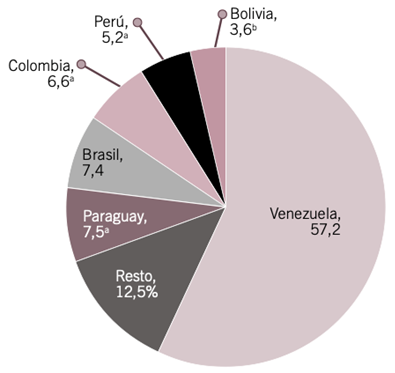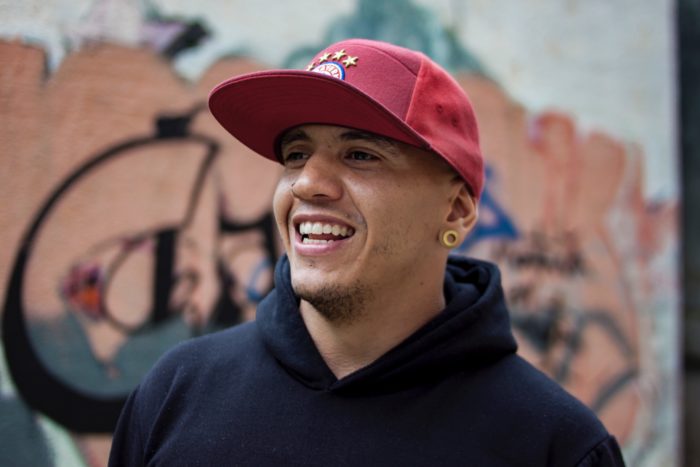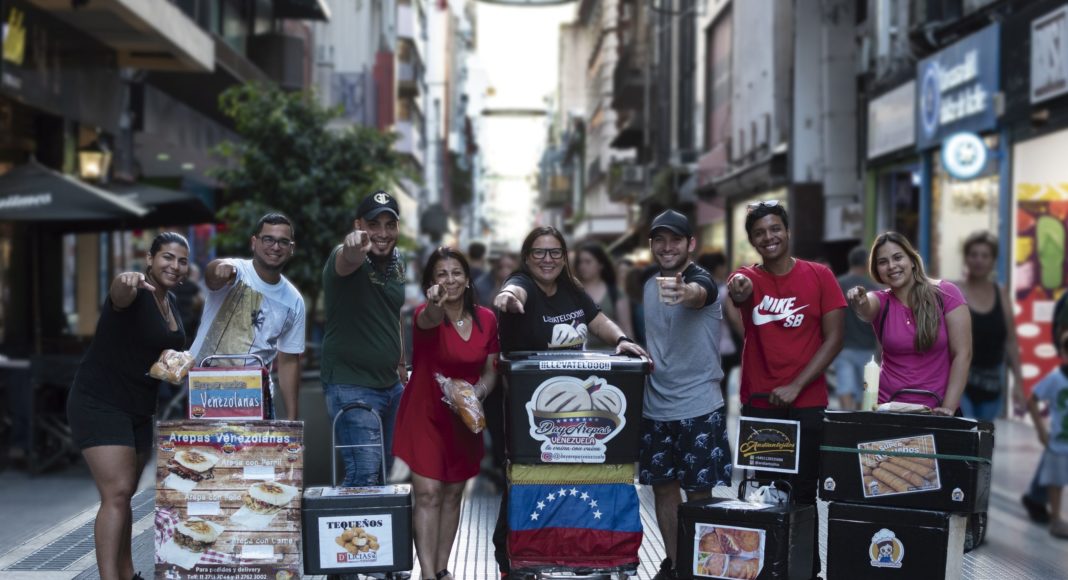‘The insecurity was terrifying and the inflation was absurd,’ said Maoli Parra, a Venezuelan in her late 20s who left Caracas in early 2018. ‘My friends and family were leaving for other places so, for me, I didn’t have much of a future to build in Venezuela.’
Maoli left for Buenos Aires, a growing destination for Venezuelans who are able to make the 4,500-mile journey south, despite Argentina sinking into a deepening economic crisis, passing through three years of recession, high foreign debt, inflation reaching 50 per cent, and a 42 per cent poverty rate.

Yet these economic fault lines are not preventing the growth of the Venezuelan community in Argentina – a country that still promises better opportunity and security. ‘It was the only option for a better future,’ said Fidel Salvatierra, a personal trainer in his early 30s who left a year later. ‘The strongest reason for emigrating was the search for a normal life.’
Immigration waves have defined Argentina for centuries: Spanish colonialism from the 16th to the 18th century; waves of European immigrants from the late 19th to the early 20th century mostly from Italy and Spain but also from Germany, Eastern Europe, and east Asia; and migration streams from neighbouring countries like Paraguay, Bolivia, Brazil, and Peru during the second half of the 20th century.
The largest migrant community
Venezuelan immigration to Argentina is a phenomenon of the last two decades, growing rapidly in the last five years. In 2016, Venezuelans were the fifth largest immigrant group in Argentina, but since 2018 they have surpassed the more established migration pathways from Bolivia and Paraguay and become the largest single group.
When the regional bloc Mercosur suspended Venezuela’s membership in 2016, its citizens were no longer granted the freedom of movement within the bloc (similar to the right of citizens of the European Union). Argentina, however, kept Mercosur visas valid, giving Venezuelans an easier pathway to legal residency even if they had an expired passport.
‘I had in mind a few countries,’ said Maoli, ‘but the most realistic opportunity, and the most accessible, was Argentina, given the ease of obtaining legal residence without much bureaucracy.’
There are currently around 250,000 Venezuelans living in Argentina. According to a 2020 study by the Argentine National Institute of Statistics and Censuses, 35 per cent of Argentina’s recent immigrants have come from the Bolivarian Republic, with six out of ten settling in the capital, Buenos Aires.
In the capital city, 57.2 per cent of recent arrivals are from Venezuela – the largest group by far, with the second largest group coming from Paraguay.

(Source: Dirección General de Estadística y Censos)
Work for the newcomers
According to the study, the average Venezuelan immigrant is a 29-year-old with a high level of education and employment, although roughly half are underemployed due to difficulties in validating and accrediting degrees as well as the lack of job opportunities as Argentina goes through a deep economic crisis.
Of the Venezuelans who reach Argentina, 70 per cent initially take on low-skilled jobs that typically have a large migrant workforce: waiters, receptionists, healthcare workers, domestic cleaners, construction workers, commercial shop assistants, and food delivery drivers.
Like the rest of the population, Venezuelans in Argentina have found it difficult to hold down a job through the persistent pitfalls of the pandemic as well as a struggling economy. Around 60 per cent stopped receiving an income since the beginning of the pandemic. And 8 in 10 don’t qualify for government welfare due to the lack of documentation; with a large informal workforce of 46 per cent many are unregistered and slip through the state safety net.

Recreating community
The number of local restaurants scattered across the city that serve tequeños (fried cheese sticks) and arepas (a maize-based bread typically filled with cheese and meat) shows the spread of Venezuelan culture. When Maoli and Fidel meet up with friends here, the topic of conversation tends to lead back home.
‘Almost always there will be conversations with respect to how we’re adapting with cultural differences,’ said Maoli. ‘We make comparisons with our lives in Venezuela and now in Argentina. The changes that we have had. We talk about politics and economics too, having in mind the conditions in Argentina today.’

For Fidel, on the major concern is those who are still trying to leave. ‘We usually talk about the problem of passports, which are practically impossible to get hold of in Venezuela,’ he said. Despite Argentina’s more open approach, getting the right documents and legalizing them can be an exhausting process for those wishing to leave Venezuela.
Concerns such as these have mobilised the growing Venezuelan community in Argentina. For example, they established El Tricolor, the first Venezuelan newspaper in Argentina: ‘We cover day-to-day news and relevant stories that affect Venezuelans,’ said founder and editor Arianny Benitez, ‘but the paper also acts as a spokesperson for the community, echoing the achievements but also the tough experiences of our members, as well as topics of interest for the community such as the migratory process, work advice, human rights.’The paper collaborates on aid projects, such as food and clothing donation campaigns, and works with social media influencers who have a following in the Venezuelan community and speak on topics such as adapting to a new culture and the different migratory processes and the required documentation. El Tricolor also works closely with the Venezuelan ambassador to Argentina, Elisa Trotta Gamus, on promoting activities and raising awareness.

‘The most important collaboration,’ added Arianny, ‘is with Provear [a non-profit dedicated to Venezuelan issues in Argentina], who keep us up to date with work with the Argentinian government to improve quality of life, access to benefits, national ID cards, and the overall health of Venezuelans in the country.’
For Venezuelans who arrived prior to 2016, it was fairly straightforward to obtain the correct documentation. Since then, however, it’s become much more complicated both when attempting to leave Venezuela and on arrival in Argentina.
‘Passports are practically impossible to get hold of in Venezuela,’ added Fidel. And the openness of the Argentine administration has cooled in recent months. The director of migrations, Florencia Carignano, criticized the special immigration programme for Venezuelans, blaming the previous right-wing government of Mauricio Macri for letting in ‘criminals‘.
The emotional impact
For many Venezuelans, migrating to Argentina means carrying with them the weight of uncertainty, the pain of leaving, and the challenge of adapting to a new culture – all of which have an emotional impact.

In response, a group of Venezuelan psychologists who moved to Argentina set up an organisation to provide support systems for other immigrants. The organisation, Psicoven, holds workshops under the umbrella of the International Organization of Migration (IOM) aiming to ‘build spaces of emotional well-being as well as promote community support and inclusion in Argentine culture and society,’ according to a Psicoven spokesperson.
Psicoven has seen a strong demand for professional mental health services among Argentina’s Venezuelan community. ‘Traditionally, Venezuelans have leant on their self-deprecating humour as a coping mechanism,’ added its spokesperson, yet those in Argentina are increasingly turning to professional help in a country where, among the middle class of Buenos Aires, therapy is the norm.
‘Among the difficulties that we’ve observed the most,’ said its spokesperson, ‘are stress, anxiety, depression, and the emotional pain of having to emigrate.’
For both Maoli and Fidel, rebuilding their lives in Argentina has meant leaving family behind. ‘In Venezuela I don’t have any friends, only my family,’ said Fidel, while Maoli keeps in touch with her parents on a daily basis. Almost all their friends have left for other countries.
The future
Two out of three Venezuelansin Argentina plan on staying in the country while 89 per cent report having a positive relationship with their local community. Plus, With easier pathways to legal residency and broader access to opportunities, the benefits, for many middle-class Venezuelans, continue to outweigh the difficulties triggered by the ongoing economic crisis in Argentina.
‘It’s difficult going through a similar situation again,’ said Maoli. ‘Yet the magnitudes of the two crises are totally different. Having gone through one before, I feel I now have some tools to deal with it personally in a better way. And while the economic crisis is getting worse here, it’s still at a point where you can manage: you have access to basic services, work, and can pay rent.’
Since arriving in 2019, Fidel has seen his monthly income as a gym instructor shrink from $700 to $100. ‘My industry is facing a pretty strong crisis,’ said Fidel. ‘Fortunately, from what I’ve built over the years as a professional, my main source of income comes from foreign currency through personal training and consultancy work.’
Venezuelans who are rebuilding their lives in Argentina, have to navigate the smaller yet still significant economic upheavals affecting their host country. Yet for many in the capital, the attraction to the city and the culture convinces them to lay their new foundations in the Southern Cone of South America. ‘I don’t have any intention of returning,’ added Fidel. ‘I would be returning to a place where I know nobody – and have only the memories of places.’

